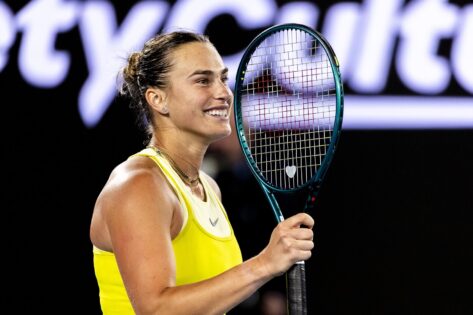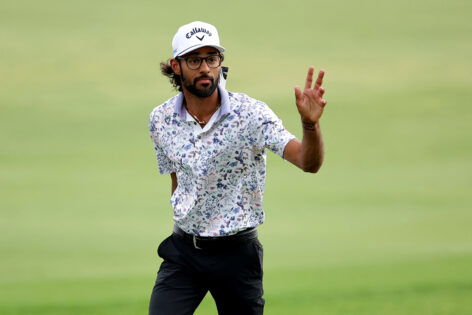The dream was blazing down the straightaway. And then suddenly, the baton dropped. Just months into its debut season, Grand Slam Track, the hyped-up brainchild of Olympic legend Michael Johnson, has abruptly canceled its marquee Los Angeles meet. It was supposed to be the league’s crowning moment, the exclamation point after stops in Kingston, Miami, and Philadelphia. Instead, it triggered a wave of sheer disappointment. Amid all, one voice stands out. For Anderson Emerole, the fallout may be deeper than just one canceled meet, and he put the issue in just the right words.
Emerole, a longtime supporter of the league, who has attended every meet so far, didn’t mince words. Speaking on The Final Leg Track and Field podcast, he warned that the situation spells serious trouble. “Optic-wise, this is really bad. Really really bad for track and field, really really bad for Grand Slam Track because of how it looks,” he said. For a league that promised to be a revolutionary force in the sport. One that was “bringing in a change…something that’s never been done,” failing to finish its first season feels like a betrayal of that promise.
And the damage isn’t just about the aesthetics. Emerole pointed out, there’s a serious breach of trust in here. “And this isn’t to disparage Grand Slam Track in any way, but it’s just the reality of—you know, fans bought tickets to go see them for a full season, right? Athletes signed, of course, contracts—whether you’re a racer or maybe you’re a challenger. There were athletes who were already saying like, “Yo I’m competing in Los Angeles,” so they must have been doing things already. So you know, that trust there—maybe agents, maybe coaches—like listen, there’s people who maybe are feeling like damn, like y’all—we trusted y’all and y’all couldn’t finish out the season,” Emerole noted.
The ramifications go beyond disappointment. They strike at the credibility of an entire project built on transforming track and field’s future. What aches more, according to Emerole, is that the man behind it all is one of the sport’s own. “Michael Johnson is one of the track and field GOATs,” he emphasized. “He’s from this sport,” added Emerole. With his track record, consisting of gold medals, world records, and global respect, Johnson wasn’t some outsider trying to cash in. He was supposed to be the insider who finally got it right. And now, with the season unraveling mid-way, it raises a deeper concern. If even someone like Johnson couldn’t pull this off, who can?
Despite his harsh assessment, Emerole isn’t rooting for Grand Slam Track to fail. In fact, quite the opposite. He’s been a visible and vocal advocate since day one, encouraging athletes to participate and attending every stop. But now, even he admits the optics are “a big, big hit” not just for the league, but for track and field itself. The cancellation of LA meet wasn’t just a scheduling hiccup. It was a credibility collapse. And rebuilding that won’t just take money or management. It’ll take trust. And that’s a currency the sport is rapidly losing. Meanwhile, with thousands of questions piling up, Michael Johnson finally broke his silence on the matter.
What nudged Michael Johnson to make the call?
Michael Johnson didn’t flinch when making the toughest call of Grand Slam Track’s debut season. Just weeks before the series was set to wrap up in Los Angeles, the Olympic legend pulled the plug, abruptly ending the campaign with a move he described bluntly as a “business decision.”
On a Thursday, June 12, Zoom call, Johnson broke the news to athletes and their representatives that the final leg in LA, scheduled for June 28–29, was off. Behind the scenes, rising operational costs and an unsustainable financial deal with UCLA had left organisers staring down potential losses of more than $2 million. “Sometimes we have to make moves that aren’t comfortable, but what’s most important is the future and sustainability of the league,” Johnson said. The cancellation may sting, but it’s part of a larger play. That is securing the league’s longevity with fresh investment, including a new sponsor announcement expected next week.
Michael Johnson remained bullish about the big picture. He stated, “We launched with a bold vision to reimagine professional track racing, and we could not be more excited about what we have accomplished so far.” From Philly’s promising 30,000-ticket turnout to a fiercely engaged young fanbase, the debut season offered glimpses of promise amid growing pains. But for Johnson, survival meant sacrifice. “The decision to conclude the inaugural Grand Slam Track season is not taken lightly,” he said. Johnson further added, “but one rooted in a belief that we have successfully achieved the objectives we set out to in this pilot season.”
The LA chapter may be shelved for now, but Johnson has made one thing clear. That Grand Slam Track’s story is far from over.
The post Biggest Issue With Grand Slam Track’s Sudden End Revealed as American Analyst Drops Harsh Reality Check appeared first on EssentiallySports.



